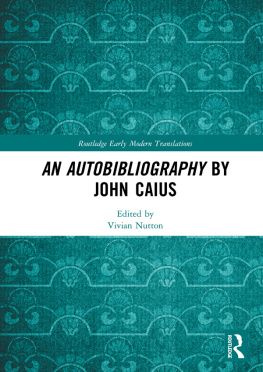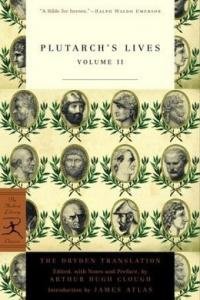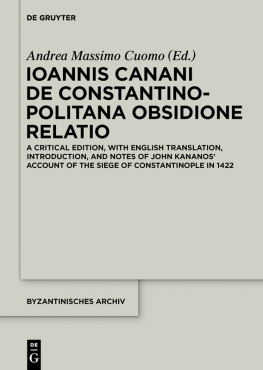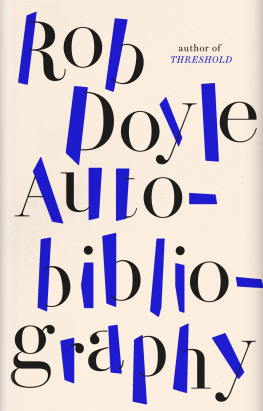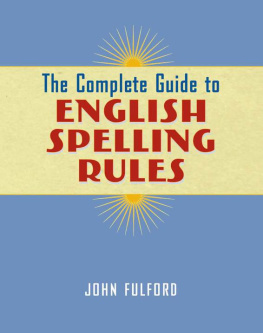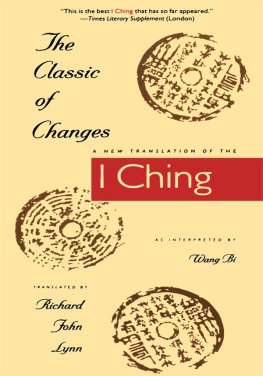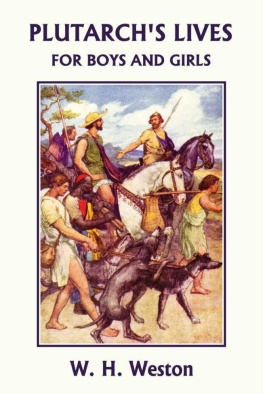An Autobibliography by John Caius
John Caius (15101573), second founder of Gonville and Caius College, Cambridge, was an English scholar with an international reputation in his lifetime as a naturalist, historian and medical writer. His Autobibliography is a major contribution to the history of English culture in the middle years of the sixteenth century and has been translated into English for the first time in this book.
Beginning with an in-depth introduction to John Caius life and works, An Autobibliography by John Caius provides a wealth of information to support and accompany the translation of this significant text. In his Autobibliography, Caius lists the books that he wrote but also details the circumstances of their writing. He describes his travels in Italy in search of manuscripts of the ancient Greek doctor Galen of Pergamum as well as giving an insight into his personal life, including his vigorously conservative views, whether on medicine, spelling and pronunciation, or on Cambridge University. His religious views, which led to the ransacking of his rooms by a Cambridge mob, are explored in detail in Appendix II of this book. In Appendix I, recent discoveries of books owned and annotated by Caius are used to supplement what he says about his activities, as well as to trace at least one of his lost works in Italy and Denmark.
The resulting picture throws light on European medicine in the sixteenth century, as well as on the humanistic culture that linked learned men and women across Renaissance Europe.
Vivian Nutton is Professor of the History of Medicine, I.M. Sechenov First Moscow State Medical University, and Emeritus Professor of the History of Medicine, University College London. Among his recent books are a translation of Galen, On Distress (2013), Ancient Medicine, 2ed (2013), and a translation of Johann Guinter and Andreas Vesalius, Principles of Anatomy according to the Opinion of Galen (2017).
Routledge Early Modern Translations
In the same series:
Principles of Anatomy according to the Opinion of Galen by Johann Guinter and Andreas Vesalius
Edited by Vivian Nutton
An Autobibliography by John Caius
Edited by Vivian Nutton
First published 2018
by Routledge
2 Park Square, Milton Park, Abingdon, Oxon OX14 4RN
and by Routledge
711 Third Avenue, New York, NY 10017
Routledge is an imprint of the Taylor & Francis Group, an informa business
2018 Vivian Nutton
The right of Vivian Nutton to be identified as author and translator of this work has been asserted by him in accordance with sections 77 and 78 of the Copyright, Designs and Patents Act 1988.
All rights reserved. No part of this book may be reprinted or reproduced or utilised in any form or by any electronic, mechanical, or other means, now known or hereafter invented, including photocopying and recording, or in any information storage or retrieval system, without permission in writing from the publishers.
Trademark notice: Product or corporate names may be trademarks or registered trademarks, and are used only for identification and explanation without intent to infringe.
British Library Cataloguing-in-Publication Data
A catalogue record for this book is available from the British Library
Library of Congress Cataloging-in-Publication Data
Names: Caius, John, 15101573, author. | Nutton, Vivian, editor.
Title: An autobibliography / by John Caius ; edited by Vivian Nutton.
Other titles: De libris propriis. English
Description: Abingdon, Oxon ; New York, NY : Routledge, 2018. |
Series: Microhistories | Includes bibliographical references and index.
Identifiers: LCCN 2018001028 | ISBN 9781138069121 (hardback : alk.
paper) | ISBN 9781315157320 (ebook)
Subjects: LCSH: Caius, John, 15101573. | MedicineEurope
History16th century. | HumanismEuropeHistory16th century. |
PhysiciansGreat BritainBiography. | ScholarsGreat Britain
Biography.
Classification: LCC R489.C3 C35 2018 | DDC 610.94dc23
LC record available at https://lccn.loc.gov/2018001028
ISBN: 978-1-138-06912-1 (hbk)
ISBN: 978-1-315-15732-0 (ebk)
Typeset in Times New Roman
by Apex CoVantage, LLC
My first debt is to three distinguished and now-deceased fellows of Gonville and Caius College, Charles Brink, Philip Grierson and Christopher Brooke, who encouraged this non-Caian thirty years ago to become interested in the second founder of their college. Indeed, I was fortunate to be able more recently to discuss some of the problems raised in this book with Christopher Brooke, as well as with two other fellows, Michael Prichard and Richard Duncan-Jones. Another Cambridge friend, Michael Reeve, has been always helpful in dealing with the complexities of Caius Latin, and greatly encouraged me in the researches into Caius work on Galen that I published in 1987. But although much of this book is concerned with Galen and with manuscripts in distant libraries, it must be understood against a much wider background of humanist studies in Britain and elsewhere. Caius was a polymath, and a translator has frequently to rely on the expertise of others, generously given, to understand fully the significance of many of his observations. Over the years I have been fortunate to be able to retrace many of Caius steps and to visit many of the Italian institutions mentioned by him, most notably at Padua, where I have been the guest at meetings organised by Silvia Ferretto, Pietro Gori, Maurizio Rippa-Bonati, Massimo Rinaldi and Gaetano Thiene. Fabio Zampieri helped resolve some of my Paduan queries, and Fabiola Zurlini has been extraordinarily diligent in securing for me copies of rare Italian publications. My understanding of Caius anatomical studies has been much helped by discussions with Francis Van Glabbeek and Julius Rocca. The two appendices resulted from questions asked by friends. Andrew Burnetts find of a reference to Caius in an Oxford note led me to the rediscovery of some of Caius conclusions he had written in a work now lost. I am grateful also for their help in tracing the fate of this book, and of others that were never published, to Nils Bruun, Klaus-Dietrich Fisher, Clarine Rijpstra-Van Daal, Sergio Sconocchia and Anders Toftgaard. My interest in Tudor Cambridge, stimulated half a century ago by discussions with the late Harry Porter, has been much refined through the assistance of Ceri Law, who showed me chapters in her forthcoming book, and of Diarmaid MacCulloch, who commented critically on a draft of the appendix. I have also benefited from conversations and correspondence with Elisa Andretti, Fabrizio Bigotti, Katharine Craik, Peter Godman, Paul Gwynne, Urs Leu, Grantley MacDonald, Richard Smith, Andrew Wear and Barbara Zipser, as well as from the genial assistance of librarians at the British Library, the Cambridge University Library, the Classical Institute, London, Eton College, Gonville and Caius College, the Wellcome Library and that great repository of European values, the Warburg Institute. The books referees provided helpful advice as well as some salutary corrections. Claudia Stein read a draft of the book, as did Holger Funk, who provided me with much material on Conrad Gessner that would otherwise have been unknown to me. Florike Egmond kindly entertained me in Rome and allowed me to see her reproductions of Caius and Gessners pictures in Amsterdam. My wife, as always, read the manuscript and improved both its English and its argument, and my granddaughter, Saskia Oswald, helped with the index. The editorial staff at Routledge have been their usual helpful selves. To all of them I am most grateful; any errors that remain are entirely my own. Reviewers will decide whether the book lives up to the standards (or to use a favourite word of John Caius, the virtus ) of the scholar whose life and works are described within it.

